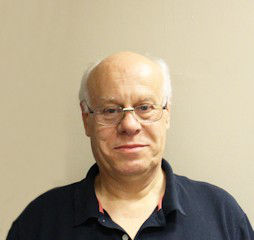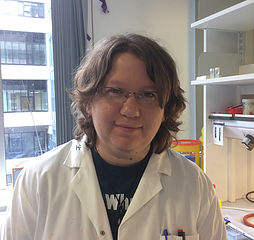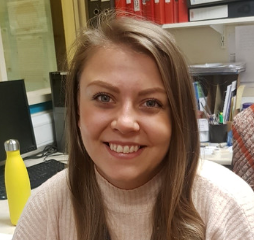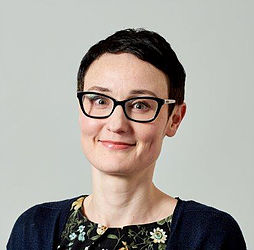Investigators

Andrew Wilson
Andy Wilson, is the Principal Investigator leading the EPSRC Programme Grant. He is a recognised leader in Supramolecular Chemical Biology. He joined The University of Leeds in 2004 and was promoted to Professor in 2012. Andy has been recognised internationally by the European Federation for Medicinal Chemistry Young Academic Scheme (2012), through the Royal Society of Chemistry (RSC) Bob Hay Lectureship (2012) and the RSC Norman Heatley award (2016). Andy’s research focuses on using synthetic molecules to understand and control molecular recognition and self-assembly. His group’s multidisciplinary approach is applied to problems in Chemical Biology and Materials Science with a strong emphasis on inhibition of protein-protein interactions. Andy leads “PPI-Net”, an RCUK-initiated academic/ industry network that defined an integrated PPI research agenda for the UK.

Thomas Edwards
Tom Edwards is an Associate Professor Biochemistry in the Faculty of Biological Sciences at Leeds University and a Deputy Director of the Astbury Centre for Structural Molecular Biology. He directs an interdisciplinary research group using all high resolution structural techniques to investigate biological problems such as PPIs in apoptosis, RNA binding proteins in development and disease, molecular motors and RNA viruses. He will use structural biology to assess inhibitors of PPIs generated during this project.

Adam Nelson
Adam was appointed as a Lecturer in Organic Chemistry at the University of Leeds in 1998. He was promoted to Professor of Chemical Biology in 2005. His research has been recognised with the award of the RSC Meldola medal (2001), Pfizer Academic award (2002), AstraZeneca award (2005), RSC Corday-Morgan medal (2007), and most recently an EPSRC Established Career Fellowship. Adam has developed synthetic approaches for systematic exploration of chemical space that will be exploited during this project.

Richard Sessions
Richard is a Senior Research Fellow in Biochemistry at the University of Bristol, where he has provided molecular modelling support and teaching for experimental scientists over the last 26 years. He is committed to the use of molecular modelling as a method of generating complex hypotheses to plan and interpret experiments. He is interested in methods development, contributing to molecular dynamics analysis, protein folding, molecular docking and the application of new computational solutions to such problems. He has received grant support from many funding bodies, including the BBSRC, EPSRC, Wellcome Trust, Royal Society, and charities including the Breast Cancer Campaign, Alzheimer’s Research Trust and the British Heart Foundation.

Dek Woolfson
Dek is a Professor in Chemistry and Biochemistry at the University of Bristol. He completed is undergraduate degree and PhD at Oxford and Cambridge Universities, respectively. Dek’s research is at the interface between chemistry and biology, applying chemical methods and principles to understand biological phenomena. His group is interested in the challenge of rational protein design, and how this can be developed for synthetic biology. He places particular emphasis on making completely new protein structures and peptide-based biomaterials for applications in cell biology and medicine. Dek’s research has been recognised through the award of the Medimmune Protein and Peptide Science Award of the Royal Society of Chemistry (first recipient, 2011), a Royal Society Wolfson Research Merit Award (2014) and RSC interdisciplinary prize (2016). Dek is Director of BrisSynBio, a £13.6M BBSRC/EPSRC-funded Synthetic Biology Research Centre.
The Researchers

Fruzsina Hobor
Fruzsina is a Postdoctoral Research Fellow working with Dr Thomas Edwards and Prof Andy Wilson. Her research focuses on the structural and biophysical characterisation of protein-protein interaction inhibitors. Fruzsina received her PhD in Biomolecular Chemistry at CEITEC, Masaryk University in Brno in 2013. Between 2014-2017 she worked as a postdoctoral research associate at University College London with Prof Andres Ramos studying mRNA localisation and miRNA partitioning by Syncrip protein.
Management Group

David Andrews
David Andrews is Associate Director, Discovery Sciences at AstraZeneca. In this role, he is accountable for many of AZ’s Discovery Chemistry project collaborations, including the development of tools and assets that foster Open Innovation ways of working. Scientifically, David’s current main interests lie in the area of Oncology, with around 60 publications and patents that span cancer and infection medicinal chemistry as well as synthetic chemistry and Open Innovation. In 2016, David returned to a full-time role in AZ’s External Sciences group following a secondment to the Royal Society of Chemistry, where he led the evaluation of the National Compound Collection pilot.

Philip Fallon
Dr Philip Fallon is a group leader in medicinal chemistry – responsible for leading research projects at Domainex Ltd. During 20 years’ of industrial experience, Philip has worked successfully in all stages of small-molecule drug discovery; from early hit identification through to lead optimisation. He is named inventor on several patents, and was part of the project team which ultimately developed MIV-711, a Cathepsin K inhibitor, currently in PhII clinical trials for osteoarthritis. Philip graduated from the University of Cambridge and obtained his PhD from Nottingham Univ. Prior to ten years’ experience at Domainex, Philip held research positions at BioFocus, Medivir, and Aventis and Rhone-Poulenc CropScience. During his career, Philip has gained experience in several therapeutic areas and target classes including protein-protein interactions. He has presented research at international conferences on protein-protein inhibitors such as neuropilin and lysine methyltransferases. His most recent publication, in Nature Communications 2018, entitled ”Small molecule inhibitors of RAS-effector protein interactions derived using an intracellular antibody fragment” reports achievements from a collaboration with Oxford University on the design of PP-inhibitors for the notoriously challenging target; RAS.

Kate Langton
Kate Langton is the Astbury Research and Innovation Manager at the University of Leeds. She obtained her BSc in Medicinal Chemistry and PhD in Chemistry and Biochemistry from Leeds. Before starting her role as Research and Innovation Manager she worked as Senior Scientist and then Product Manager for a company making scientific software that supports the drug development process.

Mike Waring
Mike is a Professor of Medicinal Chemistry and the chemistry leader in the Northern Institute for Cancer Research at Newcastle University. He joined the university in 2015 having previously worked for 14 years with AstraZeneca as a medicinal chemist, where he rose to become Principal Scientist. During this time, he worked on programmes that delivered 14 candidate drugs, including the mutant EGFR inhibitor, Osimertinib. He is a recognised expert in modern optimisation techniques and physical property control, and his work has been recognised with a number of awards such as the 2010 Capps Green Zomaya memorial medal and the 2014 RSC Biological and Medicinal Chemistry Lectureship.
PhD Students

Suzanne Renwick
Suzanne is a first year PhD student funded through an EPSRC DTP studentship in collaboration with Professor Adam Nelson to carry out research aligned with the PoPPI project on development of small molecule protein-protein interaction inhibitors. Suzanne spent some time in industry after completing her Masters Degree in Chemistry with Drug Discovery at the University of Strathclyde in 2017 and is now looking forward to directing her focus into research at the University of Leeds.
Administration

Amy Rees
Amy joined the group in October 2017 as the Research Administrator for PoPPI. Amy has over fifteen years’ experience of research administration and support, having worked on various research projects at The University of Leeds and University College London.
Former Co-workers
- Dr Aisha Jabeen Syed, PDRA 2018-2020 (PoPPI), PDRA University of Dundee.
- Dr Amaurys Avila Ibarra, PDRA 2016-2019 (PoPPI), HPC Systems Administrator at the Advanced Computing Research Centre, University of Bristol.
- Dr Emily Baker, PDRA 2019-2021 (PoPPI), Lecturer, School of Biochemistry, University of Bristol.
- Dr Gail Bartlett, PDRA 2016-18 (PoPPI).
- Dr Emma Cawood, PDRA 2020 (PoPPI), PDRA (Francis Crick Institute).
- Dr Sergio Celis, PDRA, 2019-2021 (PoPPI), PDRA University of Manchester.
- Dr Som Dutt, PDRA 2017-2019 (PoPPI), Senior Research Associateship (SRA) of Scientists’ Pool Scheme (India).
- Dr Martín Estrada Valencia, PDRA 2020-2021 (PoPPI), PDRA Bon Group University of Leeds.
- Matt Foulkes, PDRA 2018-2020 (PoPPI), Senior Scientist in Process Chemistry with AstraZeneca.
- Zsófia Hegedüs, PDRA 2016 (PoPPI) and Marie Curie Fellow 2017-2019 (Leeds), Associate Professor (Szeged, Hungary).
- Kristina Hetherington, PhD Student 2017-2021(PoPPI).
- Kat Horner, PDRA 2016-2017 (PoPPI), Research and Innovation Manager (Leeds), Project Manager NIHR (London), Senior Project Manager at UMI3 (University of Manchester).
- Dr Thomas James, PDRA 2016-2018 (PoPPI), Senior Scientist with AstraZeneca.
- Pallavi Ramsahye, Research Technician 2017-2019 (PoPPI), Research Technician, Northern Institute for Cancer Research
- Dr Deborah K. Shoemark PDRA 2019-2020 (PoPPI), PDRA (University of Bristol).
